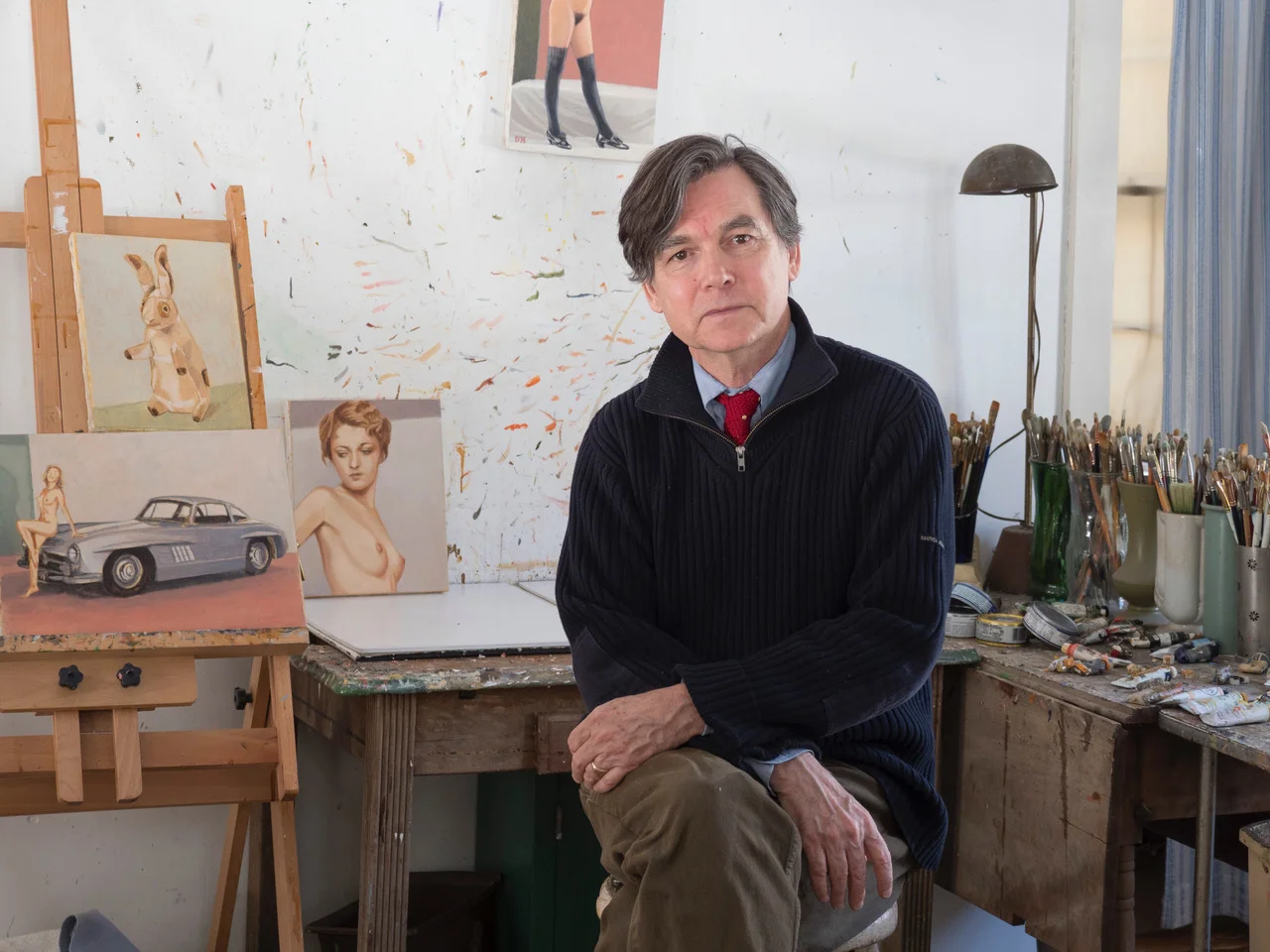AUTHOR INTERVIEW
DUNCAN HANNAH
Photo by Anne Day
Originally printed in THE LAKEVILLE JOURNAL, MARCH 22, 2018.
For many, youth is gone in a flash, with years spent longing for the excitement seen in teen films. For Duncan Hannah however, there is perhaps no movie as daring as the life he actually lived.
Cozying up in the library of his weekend home in West Cornwall, in brown corduroys with pennies in his suede loafers, it at times strains the imagination to picture this painter of understated portraits as the wild child of the 1970s, throwing his drunken body recklessly into the unknown night.
Yet, with an alert, poetic twinkle in his eye and a face not entirely changed from the beautiful downtown boy who was featured in so many photographs, one suspects that if he wandered onto a college campus now he would be less professor, more leader of the pack.
Recently, he’s revealed himself to be a lifelong diarist, and a skilled one at that. With excerpts previously published in The Paris Review, his first book, “20th Century Boy: Notebook of the Seventies” from Knopf was released this month.
Inspired at the time by the works of Jack Kerouac and Lawrence Durrell, his diaries collect the uncensored stories of his youth, from Minnesota to Bard College to New York City, where he found himself in the company of everyone from Andy Warhol to Keith Haring.
“I was always a curious kid, and I ended up meeting everyone I was curious about. New York was much smaller then, and everyone was leaving in droves. It was bankrupt, it was dangerous, it was dirty, but it was really cheap. That was great, because kids like me could move there and live on $300 a month.”
Hannah paused and added, “You could have a lot of fun on $300 a month.”
It seemed everyone he had read about or seen in photographs from his hometown in Minneapolis, Minn., could be found, live and in person, at New York nightclubs like The Mudd Club and CBGB.
“There they were. It was high-brow, low-brow, a great cross-section of lunatics and rock stars.”
He credits entering a seemingly exclusive collective of artists, musicians and cultural icons not to good networking, but to a kind of cosmic desire.
“I wasn’t calling them up on the phone, but in a way I was summoning them. I know that’s true of ghosts. If you concentrate on a ghost, chances are they’ll arise. I think it’s the same thing with people.”
Perhaps it was just the enthralling power of Hannah’s youth, his clear understanding of himself, his epicene features framed by shaggy hair, or something unexplainable and unbridled. As Hannah has discovered recently, his younger self is still summoning attention.
“I just got a nice fan letter from a girl at Phillips Exeter Academy. She had read the excepts of the book in The Paris Review, which were written by a 20-year-old, and she was 17 or 18. She was writing and just sharing her thoughts with this person, and she was very smart and quirky and well-spoken. I got two letters from her. I was thinking, it’s so funny, because she knows better, but she thinks she’s writing to this 20-year-old kid, instead of a 65-year-old man. It was so charming. It was like a J.D. Salinger experience. It was so nice to be read by the youth.”
Fittingly, one of the first to respond to Hannah’s writing was Gerry Howard, executive editor at Doubleday, whose career has helped shepherd controversial emerging talent onto the shelves. He’s edited brash icons of youth including Bret Easton Ellis and the late David Foster Wallace, and more recently edited Hanya Yanagihara’s 2015 bestseller, the fairy tale-esque sexual nightmare, “A Little Life.” Within an hour of reading requested samples from Hannah’s diaries, Howard was e-mailing for more.
Named after a 1973 T.Rex song, “20th Century Boy” is Hannah’s work for the masses — raw, in the moment, and available on the shelf for any unsuspecting student to pick up and discover.
“I love the way pop music gets to kids, right? They do everything to it. They drive to it, they get high to it, they dance to it, they make love to it. You’re really reaching people as a musician, and it was true in my youth too. Even AM radio was so important to all of us. Painting is not that way. It’s expensive and not accessible. So I’ve always been enamored with that medium, and the ability to reach youth.”
Hannah was aware at an early age that he was in possession of something older writers could only try to recapture: the immediacy of youth unfolding quickly before his eyes.
“I loved coming-of-age books, and I knew even when I was young that youth was a precious commodity. I’m sure I didn’t fully appreciate it. You can’t. But I was aware that this was a golden time of one’s life, and I knew to make the most of it. When you’re young you think things will only get better, but they don’t. There’s that window of time, 15 to 30, which can be very erotic. You’re losing your innocence, and that’s so interesting, going from innocence to experience. It’s something you can’t keep doing. You’re becoming something, and becoming something is more interesting than being something.
“Your mistakes at that age are hilarious and daunting and there’s no one way to do it. It wasn’t lost on me. Now I wish I could go back. It was [F. Scott] Fitzgerald who said, it’s not that we want our innocence back again, we want to lose our innocence again.”
